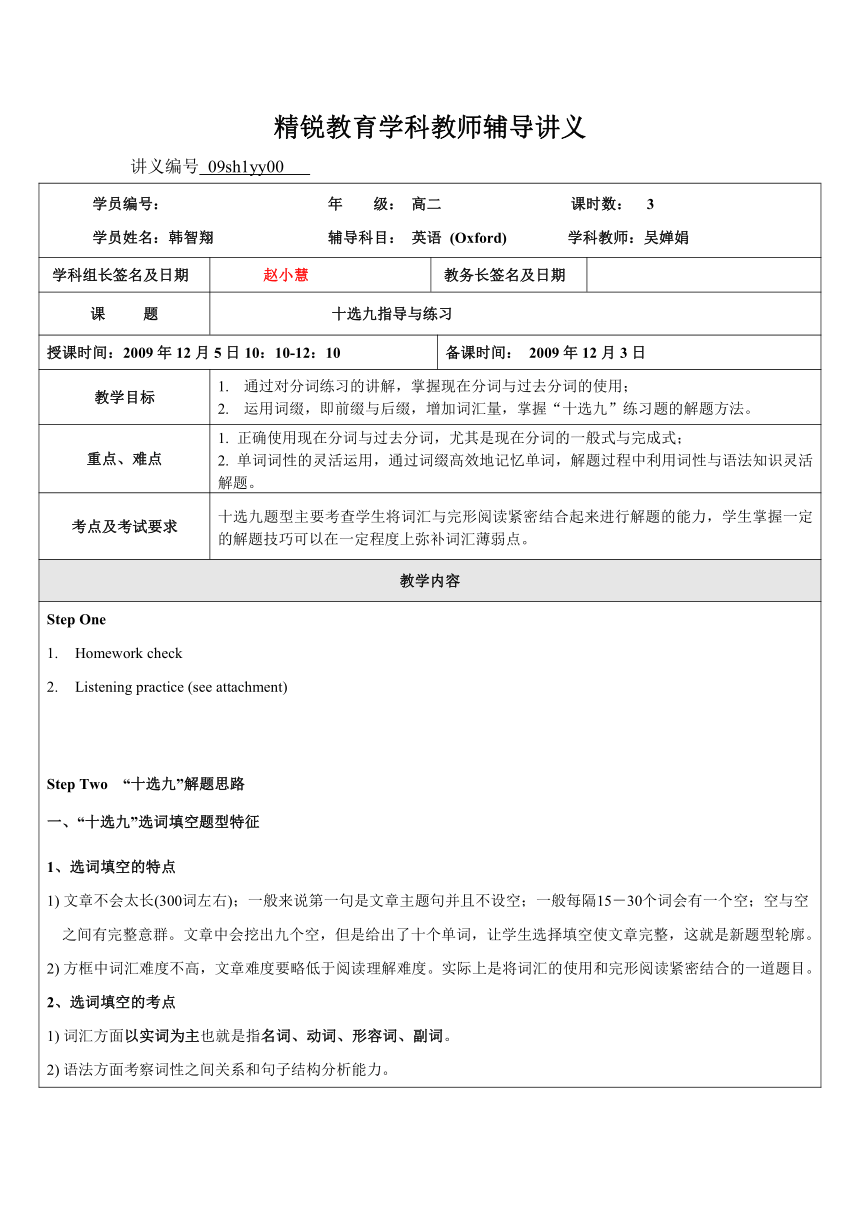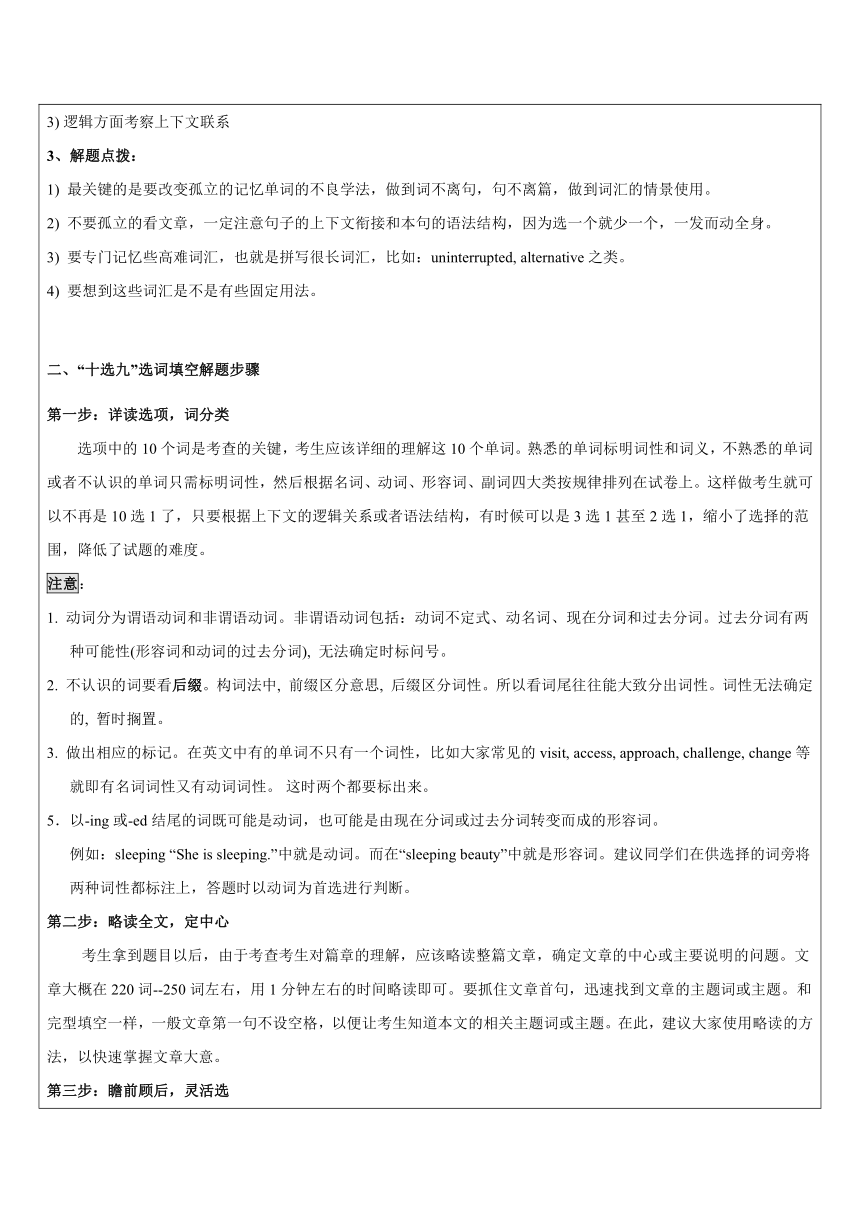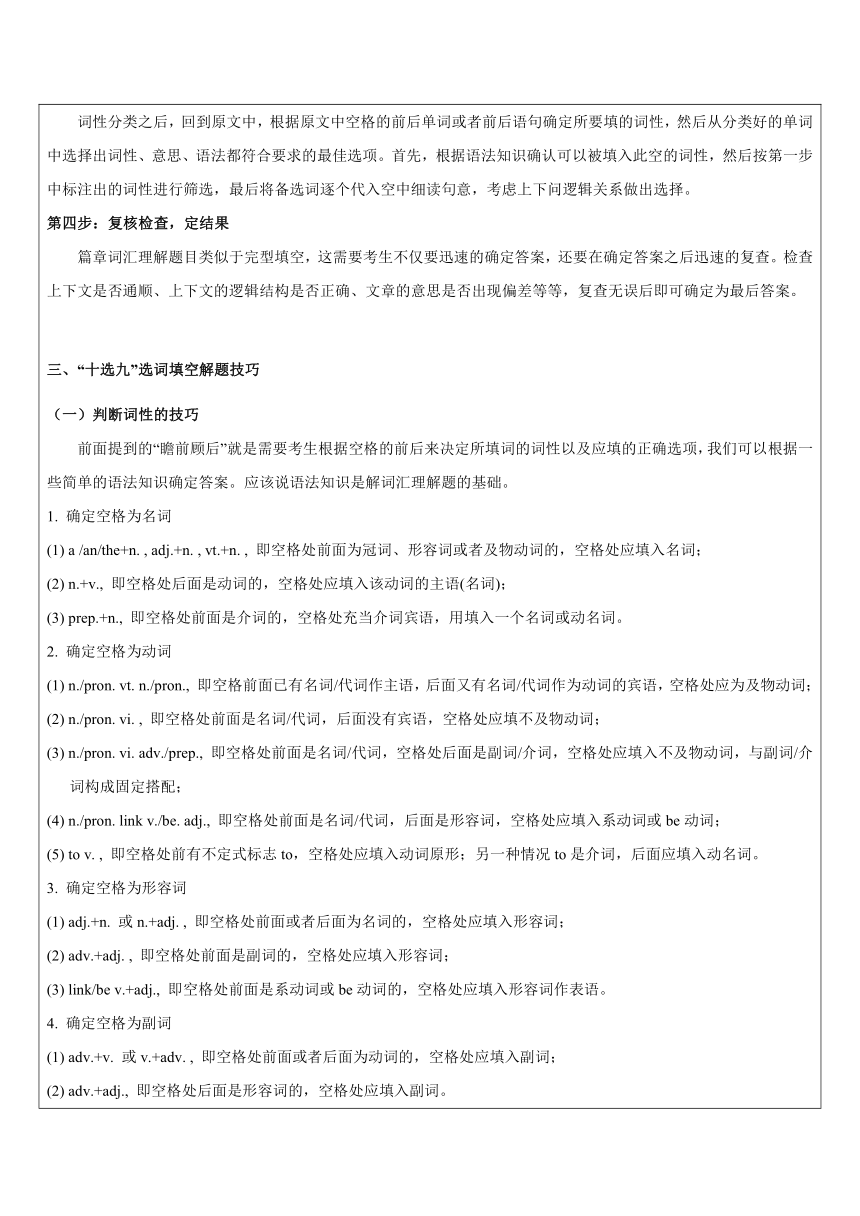上海高考十选九指导与练习
图片预览



文档简介
精锐教育学科教师辅导讲义
讲义编号 09sh1yy00
学员编号: 年 级: 高二 课时数: 3学员姓名:韩智翔 辅导科目: 英语 (Oxford) 学科教师:吴婵娟
学科组长签名及日期 赵小慧 教务长签名及日期
课 题 十选九指导与练习
授课时间:2009年12月5日10:10-12:10 备课时间: 2009年12月3日
教学目标 通过对分词练习的讲解,掌握现在分词与过去分词的使用;运用词缀,即前缀与后缀,增加词汇量,掌握“十选九”练习题的解题方法。
重点、难点 1. 正确使用现在分词与过去分词,尤其是现在分词的一般式与完成式;2. 单词词性的灵活运用,通过词缀高效地记忆单词,解题过程中利用词性与语法知识灵活解题。
考点及考试要求 十选九题型主要考查学生将词汇与完形阅读紧密结合起来进行解题的能力,学生掌握一定的解题技巧可以在一定程度上弥补词汇薄弱点。
教学内容
Step One Homework checkListening practice (see attachment)Step Two “十选九”解题思路一、“十选九”选词填空题型特征1、选词填空的特点1) 文章不会太长(300词左右);一般来说第一句是文章主题句并且不设空;一般每隔15-30个词会有一个空;空与空之间有完整意群。文章中会挖出九个空,但是给出了十个单词,让学生选择填空使文章完整,这就是新题型轮廓。2) 方框中词汇难度不高,文章难度要略低于阅读理解难度。实际上是将词汇的使用和完形阅读紧密结合的一道题目。2、选词填空的考点1) 词汇方面以实词为主也就是指名词、动词、形容词、副词。2) 语法方面考察词性之间关系和句子结构分析能力。3) 逻辑方面考察上下文联系3、解题点拨:1) 最关键的是要改变孤立的记忆单词的不良学法,做到词不离句,句不离篇,做到词汇的情景使用。2) 不要孤立的看文章,一定注意句子的上下文衔接和本句的语法结构,因为选一个就少一个,一发而动全身。3) 要专门记忆些高难词汇,也就是拼写很长词汇,比如:uninterrupted, alternative之类。4) 要想到这些词汇是不是有些固定用法。二、“十选九”选词填空解题步骤第一步:详读选项,词分类 选项中的10个词是考查的关键,考生应该详细的理解这10个单词。熟悉的单词标明词性和词义,不熟悉的单词或者不认识的单词只需标明词性,然后根据名词、动词、形容词、副词四大类按规律排列在试卷上。这样做考生就可以不再是10选1了,只要根据上下文的逻辑关系或者语法结构,有时候可以是3选1甚至2选1,缩小了选择的范围,降低了试题的难度。 注意:1. 动词分为谓语动词和非谓语动词。非谓语动词包括:动词不定式、动名词、现在分词和过去分词。过去分词有两种可能性(形容词和动词的过去分词), 无法确定时标问号。2. 不认识的词要看后缀。构词法中, 前缀区分意思, 后缀区分词性。所以看词尾往往能大致分出词性。词性无法确定的, 暂时搁置。3. 做出相应的标记。在英文中有的单词不只有一个词性,比如大家常见的visit, access, approach, challenge, change等就即有名词词性又有动词词性。 这时两个都要标出来。5.以-ing或-ed 结尾的词既可能是动词,也可能是由现在分词或过去分词转变而成的形容词。例如:sleeping “She is sleeping.”中就是动词。而在“sleeping beauty”中就是形容词。建议同学们在供选择的词旁将两种词性都标注上,答题时以动词为首选进行判断。第二步:略读全文,定中心 考生拿到题目以后,由于考查考生对篇章的理解,应该略读整篇文章,确定文章的中心或主要说明的问题。文章大概在220词--250词左右,用1分钟左右的时间略读即可。要抓住文章首句,迅速找到文章的主题词或主题。和完型填空一样,一般文章第一句不设空格,以便让考生知道本文的相关主题词或主题。在此,建议大家使用略读的方法,以快速掌握文章大意。第三步:瞻前顾后,灵活选 词性分类之后,回到原文中,根据原文中空格的前后单词或者前后语句确定所要填的词性,然后从分类好的单词中选择出词性、意思、语法都符合要求的最佳选项。首先,根据语法知识确认可以被填入此空的词性,然后按第一步中标注出的词性进行筛选,最后将备选词逐个代入空中细读句意,考虑上下问逻辑关系做出选择。第四步:复核检查,定结果 篇章词汇理解题目类似于完型填空,这需要考生不仅要迅速的确定答案,还要在确定答案之后迅速的复查。检查上下文是否通顺、上下文的逻辑结构是否正确、文章的意思是否出现偏差等等,复查无误后即可确定为最后答案。 三、“十选九”选词填空解题技巧 (一)判断词性的技巧前面提到的“瞻前顾后”就是需要考生根据空格的前后来决定所填词的词性以及应填的正确选项,我们可以根据一些简单的语法知识确定答案。应该说语法知识是解词汇理解题的基础。 1. 确定空格为名词 (1) a /an/the+n. , adj.+n. , vt.+n. , 即空格处前面为冠词、形容词或者及物动词的,空格处应填入名词; (2) n.+v., 即空格处后面是动词的,空格处应填入该动词的主语(名词); (3) prep.+n., 即空格处前面是介词的,空格处充当介词宾语,用填入一个名词或动名词。 2. 确定空格为动词 (1) n./pron. vt. n./pron., 即空格前面已有名词/代词作主语,后面又有名词/代词作为动词的宾语,空格处应为及物动词; (2) n./pron. vi. , 即空格处前面是名词/代词,后面没有宾语,空格处应填不及物动词; (3) n./pron. vi. adv./prep., 即空格处前面是名词/代词,空格处后面是副词/介词,空格处应填入不及物动词,与副词/介词构成固定搭配; (4) n./pron. link v./be. adj., 即空格处前面是名词/代词,后面是形容词,空格处应填入系动词或be动词; (5) to v. , 即空格处前有不定式标志to,空格处应填入动词原形;另一种情况to是介词,后面应填入动名词。 3. 确定空格为形容词 (1) adj.+n. 或n.+adj. , 即空格处前面或者后面为名词的,空格处应填入形容词; (2) adv.+adj. , 即空格处前面是副词的,空格处应填入形容词; (3) link/be v.+adj., 即空格处前面是系动词或be动词的,空格处应填入形容词作表语。 4. 确定空格为副词 (1) adv.+v. 或v.+adv. , 即空格处前面或者后面为动词的,空格处应填入副词; (2) adv.+adj., 即空格处后面是形容词的,空格处应填入副词。 (二)利用逻辑关系词确定答案 在篇章词汇理解题目中,文章的逻辑关系对于考生把握整篇文章是很重要的,文章的逻辑关系通过一些逻辑关系词体现的,考生可以通过逻辑关系词来确定出一些答案。 常见的逻辑关系词如下: (1) 并列关系:and, or, as well as 等 (2) 对比关系:but, however, on the contrary, rather than 等 (3) 比较关系:as…as, like, similar 等 (4) 因果关系:because, for, since, as a result of, therefore, thus 等 (5) 举例关系:for example, for instance, such as, and so on 等 (6) 递进关系:and, what’s more, moreover, in addition 等 (三)比较填词 将词性分类后,如何确定哪个选项是正确答案呢?这就需要考生进行选项间的比较,比较同词性的词汇哪一个是最佳答案。这里提示考生可以通过词义判断(即通过同词性词汇的中文意思是否符合文章的整体意思,由此判断是不是最合适的选项)和逻辑判断(即根据文章的逻辑顺序和逻辑结构,确定同词性的词汇中的哪个是最佳答案)两种方法确定答案。这里还要提示考生,填入一个词就划掉一个,为下面的选词缩小范围。 补充:构成名词的后缀一)指人1. –eer \ent engineer, volunteer merchant, agent, servant, student从事于……人
2. –er banker, observer, Londoner, villager 从事某种职业的人, 某地区,地方的人
3. –ese Japanese, Cantonese
4. –ess actress, hostess, manageress,princess 女性人称名词
5. –ian Christian, physician(内科医生),musician,地方人,信仰…….教的人,从事……职业的人
6. –ician electrician, magician, technician 精通者, ……家
二)指事物或事件1. -ion, -sion, -tion, -ation, -ition action, solution, conclusion, destruction, expression, correction, exploration, admission 行为的过程,结果,状况
2. -al refusal, arrival, survival, denial, approval 事物的动作,过程
3. -ance, -ence endurance, importance, diligence, difference, obedience,appearance, dependence性质,状况,行为,过程,总量,程度4. –ment treatment, movement, judgment, punishment, argument行为,状态,过程,手段及其结果5. –ism socialism, criticism, heroism制度,主义,学说,信仰,行为
6. –ity purity, reality, ability, diversity 性质,状态,程度
7. –ness goodness, kindness, tiredness, friendliness, willingness, happiness 性质,状态,程度
8. –th depth, wealth, truth, length, growth 动作,性质,过程,状态9. –ure failure,exposure, pressure 三)带有学术,科技含义 1)-grapy biography, calligraphy, geography ……学,写法
2)-ic, ics logic, mechanics, electronics, statistics, physics……学……法
3)-ology biology, zoology, technology(工艺学) ……学……论
4)-nomy astronomy, economy, bionomy(生态学) ……Now let’s put theory into practice!ASam had worked 30 years for the same company and now he had to retire. As a __1____ of gratitude, the company held a dinner in his ___2___. “Sam,” announced his boss, “it is my honour to ___3___ this gift to you on behalf of the company.” Sam walked down to the front of the table and accepted the gift with ___4___. It was a gold watch and on it was written “To ___5___ Sam for 30 years of service.” Sam wept, “I am at a ___6___ for words.” At home, Sam’s wife looked at the gold watch ___7____, “For this you worked 30 years A cheap gold-plated(镀金) watch ” “It’s the thought, dear,” answered Sam. “The ___8___ thing is that I am not working any more.” His wife ___9___ the gold watch to her ear and said, “Neither is your watch.”B MISTAKES ARE GOOD. You may have heard this before, but I bet you still hate the idea of ____1___ yourself in front of everybody. This is understandable. We aren’t very nice to people who make mistakes. If you have the right frame of ___2___, though, that mistake could turn out to be one of the most valuable, most important, most memorable, or most delicious accidents in history. It’s happened before --- too many times for me to ___3___. Coca-Cola was a mistake --- or at least an unexpected ___4___. Here’s what happened. In 1886 a pharmacist(药剂师) named John Pemberton cooked up a medicinal syrup(糖浆) in a large brass kettle over an open fire, ___5___ it with a big stick. He ___6___ he had created a fine drink for people who were tired, nervous, or suffering from ___7___ teeth. He and his assistant mixed it with ice water, tasted it, and claimed it tasty. They wanted some more, and the assistant ___8___ used carbonated water(碳酸水) to mix it. Instead of medicine, these men had created a bubbling drink --- one that is now ___9___ around in the world.思考:此次课你学到了什么?Step Three Assignment请加强单词的背诵,尤其是在讲义中的生词,请将他们抄写在单词本上,随时翻阅记忆;请认真完成阶段性测试,下节课带来;请完成以下练习题:PASSAGE 1A. left alone B. particularly C. being born with D. according to E. positive F. think of G. such as H. more likely to I. fool J. intelligent What makes one person more 1 than another What makes one person a genius, like the brilliant Albert Einstein, and another person a 2 Are people born intelligent or stupid, or is intelligence the result of where and how you live These are very old questions and the answers to them are still not clear. We know, however, that just 3 a good mind is not enough. In some ways, the mind is like a leg or an arm muscle. It needs exercise. Mental exercise (done with the mind) is 4 important for young children. Many child psychologists think that parents should play with their children more often and give them problems to think about. Then children are 5 grow up bright and intelligent. If children are 6 too often with nothing to do, they are more likely to become dull and unintelligent Parents should also be careful with what they say to their young children. 7 some psychologists, if parents are always telling a child that he or she is a fool or an idiot, then the child is more likely to keep doing silly and foolish things. So it is probably better for parents to say very 8 things to their children, 9 “that is a very clever thing you have done” or “you are such a smart child”.PASSAGE 2A. an unclear B. else C. mind D. activities E. place F. prepares G. of H. just I. try J. almost Did you ever have someone’s name on the tip of your tongue and yet you were unable to recall it When this happen again, don’t 1 to recall it. Do something 2 for a couple of minutes, and the name may come into your head. The name is there since you have met this person and you have heard his name. It only has to be dug out. The first effort to recall 3 the mind for operation, but it is the subconscious 4 that go to work to dig up 5 memory. Forcing yourself to recall 6 never helps because it doesn’t loosen your 7 ; it only tightens it. Students find the preparatory method helpful in examinations. They read over the questions before trying to answer any of them. Then they answer first the ones 8 which they are most certain. Meanwhile, deeper mental activities in the subconscious mind are taking 9 ; work is being done in the more difficult questions. By the time the easier questions are answered, answers to the more difficult ones will usually begin to appear into consciousness. It is often a question of waiting for recalling something to come to the memory.PASSAGE 3A. renewable B. keep the cold out C. conservation D. finally E. risesF. deal with G. resources H. temperature I. sources J. efficiently There are different ways that people try to 1 the problems of energy. One way is the greater production of common energy 2 , such as coal, oil and gas. The trouble with these sources, however, is that they are not 3 . Another way is energy 4 , which means using energy more 5 . In some very cold countries people build special houses to save energy. They place materials between the inside and the outside of the walls of the house to 6 and the warmth in. The house is heated by light body heat of people and other equipment in it. 7 , renewable energy sources are used even though they are often expensive to develop. One form of these is geothermal energy (地热能). In certain parts of the world, the 8 of the earth increases thirty degrees centigrade with each kilometer down. With six kilometers down, it 9 to nearly two hundred degrees. Heat from the earth is already used in certain countries.
A. honour B. memory C. pride D. critically E. held
F. important G. present H. faithful I. sign J. loss
A. sore B. accidentally C. mind D. consumed E. figured
F. embarrassing G. regularly H. stirring I. describe J. delight
讲义编号 09sh1yy00
学员编号: 年 级: 高二 课时数: 3学员姓名:韩智翔 辅导科目: 英语 (Oxford) 学科教师:吴婵娟
学科组长签名及日期 赵小慧 教务长签名及日期
课 题 十选九指导与练习
授课时间:2009年12月5日10:10-12:10 备课时间: 2009年12月3日
教学目标 通过对分词练习的讲解,掌握现在分词与过去分词的使用;运用词缀,即前缀与后缀,增加词汇量,掌握“十选九”练习题的解题方法。
重点、难点 1. 正确使用现在分词与过去分词,尤其是现在分词的一般式与完成式;2. 单词词性的灵活运用,通过词缀高效地记忆单词,解题过程中利用词性与语法知识灵活解题。
考点及考试要求 十选九题型主要考查学生将词汇与完形阅读紧密结合起来进行解题的能力,学生掌握一定的解题技巧可以在一定程度上弥补词汇薄弱点。
教学内容
Step One Homework checkListening practice (see attachment)Step Two “十选九”解题思路一、“十选九”选词填空题型特征1、选词填空的特点1) 文章不会太长(300词左右);一般来说第一句是文章主题句并且不设空;一般每隔15-30个词会有一个空;空与空之间有完整意群。文章中会挖出九个空,但是给出了十个单词,让学生选择填空使文章完整,这就是新题型轮廓。2) 方框中词汇难度不高,文章难度要略低于阅读理解难度。实际上是将词汇的使用和完形阅读紧密结合的一道题目。2、选词填空的考点1) 词汇方面以实词为主也就是指名词、动词、形容词、副词。2) 语法方面考察词性之间关系和句子结构分析能力。3) 逻辑方面考察上下文联系3、解题点拨:1) 最关键的是要改变孤立的记忆单词的不良学法,做到词不离句,句不离篇,做到词汇的情景使用。2) 不要孤立的看文章,一定注意句子的上下文衔接和本句的语法结构,因为选一个就少一个,一发而动全身。3) 要专门记忆些高难词汇,也就是拼写很长词汇,比如:uninterrupted, alternative之类。4) 要想到这些词汇是不是有些固定用法。二、“十选九”选词填空解题步骤第一步:详读选项,词分类 选项中的10个词是考查的关键,考生应该详细的理解这10个单词。熟悉的单词标明词性和词义,不熟悉的单词或者不认识的单词只需标明词性,然后根据名词、动词、形容词、副词四大类按规律排列在试卷上。这样做考生就可以不再是10选1了,只要根据上下文的逻辑关系或者语法结构,有时候可以是3选1甚至2选1,缩小了选择的范围,降低了试题的难度。 注意:1. 动词分为谓语动词和非谓语动词。非谓语动词包括:动词不定式、动名词、现在分词和过去分词。过去分词有两种可能性(形容词和动词的过去分词), 无法确定时标问号。2. 不认识的词要看后缀。构词法中, 前缀区分意思, 后缀区分词性。所以看词尾往往能大致分出词性。词性无法确定的, 暂时搁置。3. 做出相应的标记。在英文中有的单词不只有一个词性,比如大家常见的visit, access, approach, challenge, change等就即有名词词性又有动词词性。 这时两个都要标出来。5.以-ing或-ed 结尾的词既可能是动词,也可能是由现在分词或过去分词转变而成的形容词。例如:sleeping “She is sleeping.”中就是动词。而在“sleeping beauty”中就是形容词。建议同学们在供选择的词旁将两种词性都标注上,答题时以动词为首选进行判断。第二步:略读全文,定中心 考生拿到题目以后,由于考查考生对篇章的理解,应该略读整篇文章,确定文章的中心或主要说明的问题。文章大概在220词--250词左右,用1分钟左右的时间略读即可。要抓住文章首句,迅速找到文章的主题词或主题。和完型填空一样,一般文章第一句不设空格,以便让考生知道本文的相关主题词或主题。在此,建议大家使用略读的方法,以快速掌握文章大意。第三步:瞻前顾后,灵活选 词性分类之后,回到原文中,根据原文中空格的前后单词或者前后语句确定所要填的词性,然后从分类好的单词中选择出词性、意思、语法都符合要求的最佳选项。首先,根据语法知识确认可以被填入此空的词性,然后按第一步中标注出的词性进行筛选,最后将备选词逐个代入空中细读句意,考虑上下问逻辑关系做出选择。第四步:复核检查,定结果 篇章词汇理解题目类似于完型填空,这需要考生不仅要迅速的确定答案,还要在确定答案之后迅速的复查。检查上下文是否通顺、上下文的逻辑结构是否正确、文章的意思是否出现偏差等等,复查无误后即可确定为最后答案。 三、“十选九”选词填空解题技巧 (一)判断词性的技巧前面提到的“瞻前顾后”就是需要考生根据空格的前后来决定所填词的词性以及应填的正确选项,我们可以根据一些简单的语法知识确定答案。应该说语法知识是解词汇理解题的基础。 1. 确定空格为名词 (1) a /an/the+n. , adj.+n. , vt.+n. , 即空格处前面为冠词、形容词或者及物动词的,空格处应填入名词; (2) n.+v., 即空格处后面是动词的,空格处应填入该动词的主语(名词); (3) prep.+n., 即空格处前面是介词的,空格处充当介词宾语,用填入一个名词或动名词。 2. 确定空格为动词 (1) n./pron. vt. n./pron., 即空格前面已有名词/代词作主语,后面又有名词/代词作为动词的宾语,空格处应为及物动词; (2) n./pron. vi. , 即空格处前面是名词/代词,后面没有宾语,空格处应填不及物动词; (3) n./pron. vi. adv./prep., 即空格处前面是名词/代词,空格处后面是副词/介词,空格处应填入不及物动词,与副词/介词构成固定搭配; (4) n./pron. link v./be. adj., 即空格处前面是名词/代词,后面是形容词,空格处应填入系动词或be动词; (5) to v. , 即空格处前有不定式标志to,空格处应填入动词原形;另一种情况to是介词,后面应填入动名词。 3. 确定空格为形容词 (1) adj.+n. 或n.+adj. , 即空格处前面或者后面为名词的,空格处应填入形容词; (2) adv.+adj. , 即空格处前面是副词的,空格处应填入形容词; (3) link/be v.+adj., 即空格处前面是系动词或be动词的,空格处应填入形容词作表语。 4. 确定空格为副词 (1) adv.+v. 或v.+adv. , 即空格处前面或者后面为动词的,空格处应填入副词; (2) adv.+adj., 即空格处后面是形容词的,空格处应填入副词。 (二)利用逻辑关系词确定答案 在篇章词汇理解题目中,文章的逻辑关系对于考生把握整篇文章是很重要的,文章的逻辑关系通过一些逻辑关系词体现的,考生可以通过逻辑关系词来确定出一些答案。 常见的逻辑关系词如下: (1) 并列关系:and, or, as well as 等 (2) 对比关系:but, however, on the contrary, rather than 等 (3) 比较关系:as…as, like, similar 等 (4) 因果关系:because, for, since, as a result of, therefore, thus 等 (5) 举例关系:for example, for instance, such as, and so on 等 (6) 递进关系:and, what’s more, moreover, in addition 等 (三)比较填词 将词性分类后,如何确定哪个选项是正确答案呢?这就需要考生进行选项间的比较,比较同词性的词汇哪一个是最佳答案。这里提示考生可以通过词义判断(即通过同词性词汇的中文意思是否符合文章的整体意思,由此判断是不是最合适的选项)和逻辑判断(即根据文章的逻辑顺序和逻辑结构,确定同词性的词汇中的哪个是最佳答案)两种方法确定答案。这里还要提示考生,填入一个词就划掉一个,为下面的选词缩小范围。 补充:构成名词的后缀一)指人1. –eer \ent engineer, volunteer merchant, agent, servant, student从事于……人
2. –er banker, observer, Londoner, villager 从事某种职业的人, 某地区,地方的人
3. –ese Japanese, Cantonese
4. –ess actress, hostess, manageress,princess 女性人称名词
5. –ian Christian, physician(内科医生),musician,地方人,信仰…….教的人,从事……职业的人
6. –ician electrician, magician, technician 精通者, ……家
二)指事物或事件1. -ion, -sion, -tion, -ation, -ition action, solution, conclusion, destruction, expression, correction, exploration, admission 行为的过程,结果,状况
2. -al refusal, arrival, survival, denial, approval 事物的动作,过程
3. -ance, -ence endurance, importance, diligence, difference, obedience,appearance, dependence性质,状况,行为,过程,总量,程度4. –ment treatment, movement, judgment, punishment, argument行为,状态,过程,手段及其结果5. –ism socialism, criticism, heroism制度,主义,学说,信仰,行为
6. –ity purity, reality, ability, diversity 性质,状态,程度
7. –ness goodness, kindness, tiredness, friendliness, willingness, happiness 性质,状态,程度
8. –th depth, wealth, truth, length, growth 动作,性质,过程,状态9. –ure failure,exposure, pressure 三)带有学术,科技含义 1)-grapy biography, calligraphy, geography ……学,写法
2)-ic, ics logic, mechanics, electronics, statistics, physics……学……法
3)-ology biology, zoology, technology(工艺学) ……学……论
4)-nomy astronomy, economy, bionomy(生态学) ……Now let’s put theory into practice!ASam had worked 30 years for the same company and now he had to retire. As a __1____ of gratitude, the company held a dinner in his ___2___. “Sam,” announced his boss, “it is my honour to ___3___ this gift to you on behalf of the company.” Sam walked down to the front of the table and accepted the gift with ___4___. It was a gold watch and on it was written “To ___5___ Sam for 30 years of service.” Sam wept, “I am at a ___6___ for words.” At home, Sam’s wife looked at the gold watch ___7____, “For this you worked 30 years A cheap gold-plated(镀金) watch ” “It’s the thought, dear,” answered Sam. “The ___8___ thing is that I am not working any more.” His wife ___9___ the gold watch to her ear and said, “Neither is your watch.”B MISTAKES ARE GOOD. You may have heard this before, but I bet you still hate the idea of ____1___ yourself in front of everybody. This is understandable. We aren’t very nice to people who make mistakes. If you have the right frame of ___2___, though, that mistake could turn out to be one of the most valuable, most important, most memorable, or most delicious accidents in history. It’s happened before --- too many times for me to ___3___. Coca-Cola was a mistake --- or at least an unexpected ___4___. Here’s what happened. In 1886 a pharmacist(药剂师) named John Pemberton cooked up a medicinal syrup(糖浆) in a large brass kettle over an open fire, ___5___ it with a big stick. He ___6___ he had created a fine drink for people who were tired, nervous, or suffering from ___7___ teeth. He and his assistant mixed it with ice water, tasted it, and claimed it tasty. They wanted some more, and the assistant ___8___ used carbonated water(碳酸水) to mix it. Instead of medicine, these men had created a bubbling drink --- one that is now ___9___ around in the world.思考:此次课你学到了什么?Step Three Assignment请加强单词的背诵,尤其是在讲义中的生词,请将他们抄写在单词本上,随时翻阅记忆;请认真完成阶段性测试,下节课带来;请完成以下练习题:PASSAGE 1A. left alone B. particularly C. being born with D. according to E. positive F. think of G. such as H. more likely to I. fool J. intelligent What makes one person more 1 than another What makes one person a genius, like the brilliant Albert Einstein, and another person a 2 Are people born intelligent or stupid, or is intelligence the result of where and how you live These are very old questions and the answers to them are still not clear. We know, however, that just 3 a good mind is not enough. In some ways, the mind is like a leg or an arm muscle. It needs exercise. Mental exercise (done with the mind) is 4 important for young children. Many child psychologists think that parents should play with their children more often and give them problems to think about. Then children are 5 grow up bright and intelligent. If children are 6 too often with nothing to do, they are more likely to become dull and unintelligent Parents should also be careful with what they say to their young children. 7 some psychologists, if parents are always telling a child that he or she is a fool or an idiot, then the child is more likely to keep doing silly and foolish things. So it is probably better for parents to say very 8 things to their children, 9 “that is a very clever thing you have done” or “you are such a smart child”.PASSAGE 2A. an unclear B. else C. mind D. activities E. place F. prepares G. of H. just I. try J. almost Did you ever have someone’s name on the tip of your tongue and yet you were unable to recall it When this happen again, don’t 1 to recall it. Do something 2 for a couple of minutes, and the name may come into your head. The name is there since you have met this person and you have heard his name. It only has to be dug out. The first effort to recall 3 the mind for operation, but it is the subconscious 4 that go to work to dig up 5 memory. Forcing yourself to recall 6 never helps because it doesn’t loosen your 7 ; it only tightens it. Students find the preparatory method helpful in examinations. They read over the questions before trying to answer any of them. Then they answer first the ones 8 which they are most certain. Meanwhile, deeper mental activities in the subconscious mind are taking 9 ; work is being done in the more difficult questions. By the time the easier questions are answered, answers to the more difficult ones will usually begin to appear into consciousness. It is often a question of waiting for recalling something to come to the memory.PASSAGE 3A. renewable B. keep the cold out C. conservation D. finally E. risesF. deal with G. resources H. temperature I. sources J. efficiently There are different ways that people try to 1 the problems of energy. One way is the greater production of common energy 2 , such as coal, oil and gas. The trouble with these sources, however, is that they are not 3 . Another way is energy 4 , which means using energy more 5 . In some very cold countries people build special houses to save energy. They place materials between the inside and the outside of the walls of the house to 6 and the warmth in. The house is heated by light body heat of people and other equipment in it. 7 , renewable energy sources are used even though they are often expensive to develop. One form of these is geothermal energy (地热能). In certain parts of the world, the 8 of the earth increases thirty degrees centigrade with each kilometer down. With six kilometers down, it 9 to nearly two hundred degrees. Heat from the earth is already used in certain countries.
A. honour B. memory C. pride D. critically E. held
F. important G. present H. faithful I. sign J. loss
A. sore B. accidentally C. mind D. consumed E. figured
F. embarrassing G. regularly H. stirring I. describe J. delight
